Marking 125 Years after the death of pioneer pastor - Fr.Urban Stein S.J.
Marking 125 Years after the death of pioneer pastor - Fr.Urban Stein S.J.
Mangalore Today News Network
I J Saldanha-Shet, Mangalore
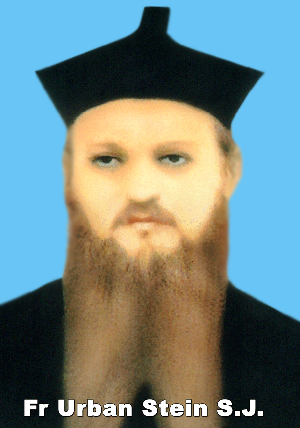 Mangalore, Dec 30, 2013: The Ursuline Franciscan Sisters (UFS) born and developed in Mangalore marks the 125 years jubilee of the death of their very revered founder Fr.Urban Stein S J in 1888 - at Rosario Cathedral, on December 30, 2013. Mangalore Today is gracefully glad to place before its readers the exclusive history of this great pioneer and the Ursuline Sisters whose base is now Mangalore and serve committed in India and overseas. The Ursuline Congregation is for some years now headed by V Rev.Sr.Doreen D’Souza UFS, along with her General Council, Provincial Council and committees is intensely involved in good work in Education, Social and Medical care fields in many parts of India, parts of Europe and Africa. Notably Schools, College, Orphanages, Old age homes, Dispensaries and an Institutions to house and train mentally challenged Children in Venur DK are a few to name. An over view of the History is called for:
Mangalore, Dec 30, 2013: The Ursuline Franciscan Sisters (UFS) born and developed in Mangalore marks the 125 years jubilee of the death of their very revered founder Fr.Urban Stein S J in 1888 - at Rosario Cathedral, on December 30, 2013. Mangalore Today is gracefully glad to place before its readers the exclusive history of this great pioneer and the Ursuline Sisters whose base is now Mangalore and serve committed in India and overseas. The Ursuline Congregation is for some years now headed by V Rev.Sr.Doreen D’Souza UFS, along with her General Council, Provincial Council and committees is intensely involved in good work in Education, Social and Medical care fields in many parts of India, parts of Europe and Africa. Notably Schools, College, Orphanages, Old age homes, Dispensaries and an Institutions to house and train mentally challenged Children in Venur DK are a few to name. An over view of the History is called for:
The unique grace, that flows from the personality and spirit of Fr Urban Stein S J, has positively made an indelible stamp on Mangalore and his vision grows in strength even to this day visibly. It continues to nurture and ignite the indigenous ’Ursuline Franciscan Sisters’ of Mangalore that he master minded prompted by Almighty.
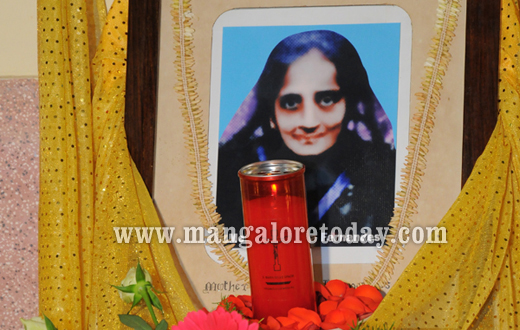
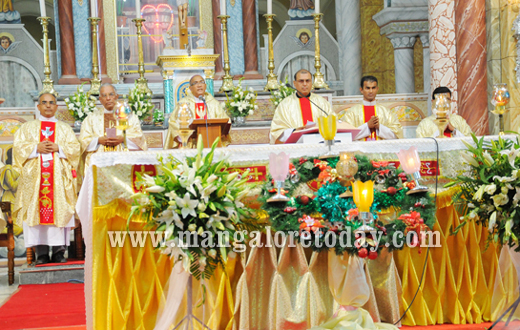
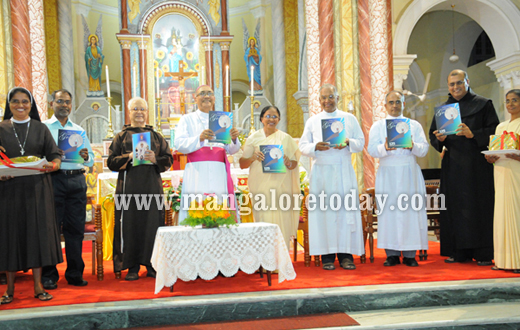
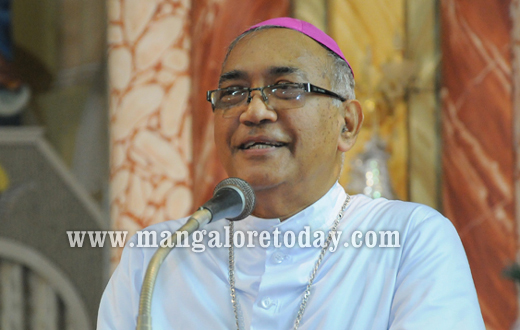
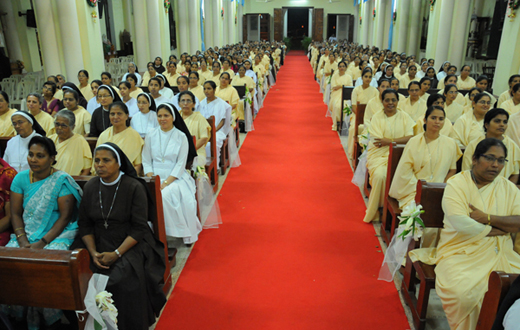
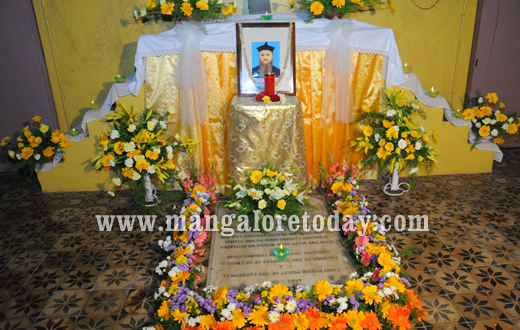
The grace, zeal and life of the pioneer pastor, Jesuit Fr Urban Stein, prompts a glowing deep intrinsic saintliness that becomes incandescent. Fr Urban sacrificed him self heroically for his fellows. This has been chronicled in the Mangalore church history at various levels over the decades. He formed the forerunner of the ’Ursuline Franciscan Sisters (UFS)’ the first indigenous order women, on Easter Sunday April 10, 1887 at Rosario Cathedral Parish that then covered the entire Western half of the present greater Mangalore. The details of his heroic death on October 21, 1888 - 125 years ago - soon after he returned from Goa, his funeral and everlasting memory are little exposed to people of Mangalore.
During his tenure as the first Parish Priest of Rosario Cathedral Parish from 1879 to 1888 he had to play many a role in the scenario different and difficult to imagine. This consecrated man of grace and vision, Fr Stein did not fail to see clearly before him the prime needs of the people of Mangalore. He was pained at the condition of the ’Cathedral’ and did his best to improve it, his dream of a worthy edifice materialized a decade after his death. Many an enlightened chronicler, has recorded this truth in the many historical works that exist.
Fr Urban Stein notably was the youngest of the first batch of Jesuits who landed in Mangalore in December 1878. But, his dedicated maturity was far beyond his years. The spiritual life of his folk, estimated at about 10,000 at Rosario. His personal devotion was saintly.
The leaders of a concerned band of twelve women, like Sr Nympha Fernandez, full of spirit is to be remembered on this occasion. The surroundings of Rosario was called ’Bundar’, the main sea port of early Mangalore. There was a great deal of hustle and bustle, passage of people of all kinds. The resident general population was dominantly simple working class, they and their children expressly needed basic education and instruction to better their lives in many ways at that point in time.
Among the Catholic population their were young women well educated for the times. These young women of good family back ground normally married at a young age. Some could not leave their families for many good reasons and they had no satisfying occupation. Fr Stein, practically assessed the realities and applied his mind and inspiration.With good care and fore thought he organised the ‘Company of St Ursula’. This was the fore runner of what is today seen as the 125 plus year old ’Ursuline Franciscan Sisters’ (UFS) born and rooted in Mangalore. This is one of the oldest and wide spread ’Indigenous Congregations of women’ which has now spread overseas without discrimination, the services of the ’Ursuline Congregation’ are wide marching on with the motto "For the Love of God" with synergy and choice blessings of the Lord and the leadership of inspired individuals. Now in the wake of the 125 years of the founding of the roots of the Ursuline Congregation of Mangalore gratefully marked is the 125th death anniversary ( October 21,1888 - 2013) of the founder Jesuit Fr Urban Stein of beloved memory.
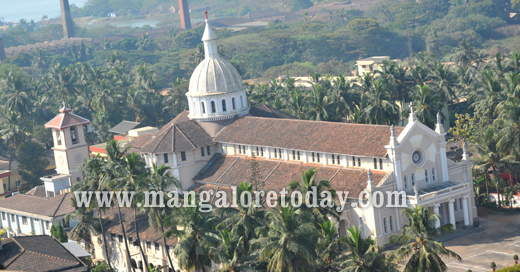
ROSARIO’s FIRST PARISH PRIEST - Rev Fr URBAN STEIN S.J:
From German Rome to Rome of India : Fr Urban Stein S J, was born on August 21,1845 in Cologne-on-the-Rhine, reputed as ’German Rome’ due to its Catholic Character. He served the last fruitful decade 1879 to 1888 in Mangalore. Local journals in the last century have referred to Mangalore as ’Rome of India’. Little Urban’s parents were John Stein and Anna Elizabeth nee’ Durst. Young Urban Stein did his early studies at the Gymnasium of St Marcellus, a School with Jesuit traditions. On September 30, 1862 he joined the novitiate at Friedrichsburg near Munster, Westphalia. His refinement and pleasant humility endeared him to all. Those who knew him well could also find in him a singleness a life of purpose. Submission to the demands of obedience and a burning zeal for the ’salvation of souls’ was all consuming in his life. He pronounced his first vows on October 10, 1864, further studies followed.
His one firm aim was to work in the missions for the greater glory of God. His dream came true sooner than later, on completion of philosophy studies he was sent to Bombay, India where he landed on December 10,1870. Bro Urban worked tirelessly combining active work with his theological studies and was ordained a priest aged 31, on December 22, 1876 at Bombay, now Mumbai. He served in the Jesuit institutions in Bombay. On December 26, 1878 he landed in Mangalore with the first group of Jesuits; he was youngest of the lot, hardly two years a priest.
He was dedicated to his calling and had already proved his worth. In Mangalore, February 1879, his superiors did not hesitate to entrust him with the heavy responsibility of the largest and most important of the parishes in the vicarate - the Rosario Cathedral Mangalore. Going round his parish and studying the state of affairs he realized that the neglect of spiritual life post captivity had given rise to many shortcomings in the parish. The impact of 15 years captivity (1784-99) of a large section of Mangalore Catholics was fresh and the generation of the era was still weighed down by its consequences. Another young Jesuit Fr. A.Frachetti was appointed to assist him.
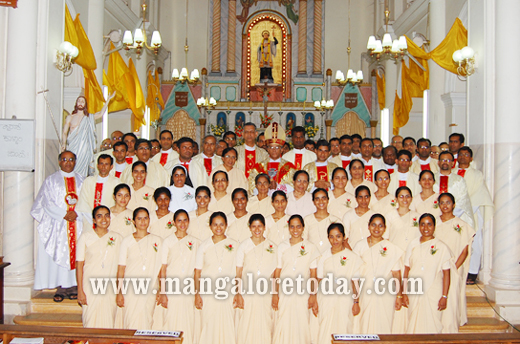
Founding ’Ursulines’ in Mangalore: The wide spread parish was made up of different levels of people. Their wide ranging needs required to be attended to intensively and effectively. He needed hands to join with him in this great service. There were a number of young reasonably educated Catholic ladies who on one hand unprepared to enter in to marriage and on the other unwilling for good reasons to enter a convent and needed to stay with their elders. It is this group of potential talent that concerned Fr.Stein. The role of laity in the church of Mangalore in those time was far removed from what is seen now, particularly in the case of women. A Jesuit priests mentions how women had to attend church wrapped in a cotton cloth called ‘whol’. The early Basel Mission of Lutheran Christianity was an active competitor in Mangalore proper and most of those missionaries were German. He obtained the rule book of Brescian Ursulines who even sent statues of St Ursula and St Angela to Mangalore, they are still preserved. The twelve ‘sisters’ under the guidance of their ‘Founder’ Fr Urban Stein pronounced simple vows in the presence of Bishop N M Pagani S J in February 1888 but continued to live in their respective homes. In 1901 with the initiative of Mother Nympha their convent was erected behind the Cathedral and today it serves as a foundation memorial to the pioneers (apart form a convent, a social and medical centre, a hostel for students and a good home for the aged is maintained). In 1934 the congregation was canonically erected and became a regular religious order. With Mangalore as its haven today it sails on from strength to strength and serves not only all over India but in missions overseas too, near one thousand strong today serve .
Death & Funeral: The saintly death of Fr Urban Stein recorded in many publications by credible observers, creates ripples of admiration. The able Fr Stein was delegated to to Old Goa early in October 1888, to get documents from the church archives there for legal process in the courts which were urgently needed. He sailed to Panjim and stayed there for a few days facing a rough situation due to lack of proper lodging and poor food. He was considerably sick and weak, his delicate stomach had revolted due to the unhygienic conditions. Unwittingly he desired to speed up his return to Mangalore and in the absence of a proper steam vessel embarked on a country sail boat. The Sea voyage was distressing, his already disturbed body became worse due to lack of food and the intensity of the direct sun as the country boat had no shelter worth the name. His fellow Jesuits and flock at Mangalore were shocked that he was critically sick when he landed at Bundar on October 16, 1888. The doctors feared the worst seeing his grave condition he was taken to St Aloysius College for better care by his superiors. His condition deteriorated fast. He received last sacrament and he died a well prepared and holy death on Sunday November 21, 1888 with the prayers of his fellow Jesuits. The news of his death spread like wild fire in the town. The body was laid out at the Cathedral and a stream of people paid homage and prayed the whole night in tears. At 8 am on November 22, a well attended pontifical mass was celebrated and the same evening the burial took place in the Cathedral where it is recorded that not less than 5 to 6 thousand gathered. Records convey that Fr Stein was laid to rest in the presbytery at the feet of Mgr.Marie Ephraim OCD the last vicar of Mangalore by the Jesuit confreres and unprecedented mourning, the spot is marked by a memorial stone just behind the high alter at present. Thus the very great life of heroic service in the vineyard of the Lord came to an end in this temporary world.’Death is not the last sleep, it is the final awakening."
BRIEF HISTORY of ROSARIO MANGALORE: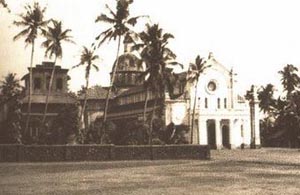 Rosario Cathedral is the mother church of Mangalore Diocese, in it’s undivided form and presently the new shape too. The structure of the ’Rosario Cathedral’ now standing was built between 1910-15 basically, construction is said to have continued till 1924, it is designated as a Cathedral since 16th April 1850. It’s high dome is an impressive miniature of Vatican’s St.Peter’s Basilica. The inscription seen above the main entrance pillars and portico reads “1568 – Queen of the Rosary Bless India – 1915”. This may be interpreted as: The first ever Rosario church of the area (not necessarily this spot) was established in 1568 and the present visible building structure was dedicated in 1915 AD. There fore it is now 445 years since 1568 when the first Rosario church was established in the vicinity. History says, the first Nossa Senora de Rosario, within the Fort came to be known as the ’the church of sand’, ’poyed iggerji’ in Tulu the local language. The memory of the Portuguese Fort, still lives on in the name of an area near by ‘haleye kote’ and ’batthery garden’ opposite the confluence -’aluve bagilu’, of the rivers Nethravathi, Gurpur and the Arabian Sea in the westerly direction, which has provided the Tulu language name of ’Kudla’ still in use. The name ’Mangalore’ has evolved from ’Mangala-Uru’ / ’Mangaluru’. The name ’Mangala’ originates directly from more than thousand year old temple here of the mythological Goddess ’Mangaladevi’.
Rosario Cathedral is the mother church of Mangalore Diocese, in it’s undivided form and presently the new shape too. The structure of the ’Rosario Cathedral’ now standing was built between 1910-15 basically, construction is said to have continued till 1924, it is designated as a Cathedral since 16th April 1850. It’s high dome is an impressive miniature of Vatican’s St.Peter’s Basilica. The inscription seen above the main entrance pillars and portico reads “1568 – Queen of the Rosary Bless India – 1915”. This may be interpreted as: The first ever Rosario church of the area (not necessarily this spot) was established in 1568 and the present visible building structure was dedicated in 1915 AD. There fore it is now 445 years since 1568 when the first Rosario church was established in the vicinity. History says, the first Nossa Senora de Rosario, within the Fort came to be known as the ’the church of sand’, ’poyed iggerji’ in Tulu the local language. The memory of the Portuguese Fort, still lives on in the name of an area near by ‘haleye kote’ and ’batthery garden’ opposite the confluence -’aluve bagilu’, of the rivers Nethravathi, Gurpur and the Arabian Sea in the westerly direction, which has provided the Tulu language name of ’Kudla’ still in use. The name ’Mangalore’ has evolved from ’Mangala-Uru’ / ’Mangaluru’. The name ’Mangala’ originates directly from more than thousand year old temple here of the mythological Goddess ’Mangaladevi’.
The post captivity (1799) Rosario Church came into being in the year 1813, its location is believed to be the present spot of the Cathedral. The building of the present magnificent edifice commenced in 1910 and was opened in 1915, Bro.Divo SJ of Bombay is credited to be it’s architect. Most Bishops of Mangalore, a few priests and parishioners until mid 1900s were entombed behind and around the present high altar and other portions here in Rosario Cathedral. It still has a traditional pulpit used annually on Good Friday. This Cathedral, is the official seat of the Bishop of Mangalore, though for decades now the Bishop resides at the ’Bishops House’ at Kodialbail a couple of kilometers away. The present visible majestic aging edifice is set to celebrate a Century - one hundred years, in 2015.
The Roman Catholic faith in Mangalore grew from emigrant Konkanis of ’Saraswat’ origins - even at present the official language of this diocese is Konkani. "The History of the Diocese of Mangalore", (Fr.Moore SJ,published 1905), mentions Blessed Fr Joseph Vas (Apostle of Ceylon); arrived from Goa (C1681) repaired the Rosario Church, at that time considered the ’Factory Church’ and was a primitive structure probably to the South. Kanara Vicarate was established by the Holy See in December 1845 under Bishop Bernadine as Vicar Apostolic. In 1878 the Vicarate of Mangalore came into the hands of the Jesuits of Venice and Fr. Urban Stein a German was appointed the first parish priest. The present western half of the city limits was a single parish under Rosario, in 1866 the first parish division took place followed at regular intervals. Presently there are several Catholic parishes in Mangalore proper : Milagres, Bendur, Bijey, Urwa, Kulur, Angelore, Valencia, Cascia, Jeppu and so on. Pope Leo XIII decreed to set up a hierarchy in India; Mangalore became an independent diocese on January 25, 1887. It is but understandable that there is some confusion about the original statue of Our Lady of the Rosario prior to the Captivity. It is believed the beautiful ancient tall wooden statue preserved in the ’Aloysium’ of St Aloysius College was an early center piece of Rosario, see picture. The statue in the picture, noting the draping of the saree and pleats of the skirt and other features indicate it was done by Ceylonese wood carvers, it is known that Ceylonese wood artists worked in Old Goa.
Apart from normal continuous improvements, since 2008 Rosario interior and surroundings have been given aesthetic face lifts; the sanctuary area has been artistically animated with paintings particularly in the sanctuary and the dome. There has been consistent upgrading and conservation. The credit is attributed to the Parish Priests, the Parish Council and many others. The Catholic churches of Mangalore like Rosario are now made up of many Institutions, Convents, Educational and Socio-Religious action, Youth development groups and more. The Diocese of Mangalore celebrated it’s Post Centenary Silver Jubilee, 125 years (1887-2012), in a memorable manner in February 2012 one of the major celebrations took place here at Rosario. Later on July 16, 2012 this dynamic diocese was bifurcated in to Mangalore and Udupi diocese. It is a long desired positive move seen to bring multifaceted development all around and welcomed by all.
Fr.Urban’s Pastoral Legacy: A letter in the ’Examiner’ of Bombay, soon after the death of Fr.Urban in 1888 echos the sentiments of the Jesuits of Mangalore : Thank the Lord for Fr.Stein who died at the College. The last edification he provided and the blessings he drew upon us. In his eulogy Fr.Rossi concludes, "What is of great import to us is that he lived a good religious and so did he die a saint."
"Saints do not desire followers, they create saints".’Servant of God’ Mgr.Raymond F C Mascarenhas, founder of the ’Bethany Sisters (BS)’ and the first Mangalorean priest to set out on the path of sainthood in the church a ’Compassionate Pastor’, was ordained at Rosario on March 4,1900. He seems to have taken a leaf out of the book of pioneer Fr Stein as a role model. Fr Raymond was an impressionable bright lad who was at St Aloysius when Fr Stein was the Vicar of Rosario and would certainly have experienced the influence of Fr Stein directly and indirectly. Therefore, it is not beyond reason that there is an undeniable connection between these two great priests both founders; saintliness is the baton passed from the Lord above to the good and faithful. Fr.Urban Stein stands out a faithful hand of God in his mission here which continues heroically. The year of faith (Nov 2012 - Nov 2013) that has just ended will inspire faith in the faithful and all those that minister and guide the work of the divine Lord.
Post Centenary Silver Jubilee.125 years (1888-2012) of UFS: On April 12, 2012, along with a host of Bishops, priests, religious, faithful and well-wishers all Ursuline Franciscan Sisters (UFS) at Rosario Cathedral, Mangalore, marked the blessings of the Lord to the congregation in His service for 125 years.
There is no doubt that this land mark celebration and the many projects initiated is bringing showers of blessings to the church. It is note worthy that the presence of Most Rev Rogath Kimario, Bishop of Same, Tanzania along with a group of Ursuline Franciscan Lay Association (UFLA) members brought about a consensus and the Diocese of Mangalore under the leadership of Most Rev Dr Aloysius Paul D’Souza, decided to establish a mission in ’Same Diocese of Tanzania’ which has made tremendous progress in the last one year. The Ursulines (UFS), UFLA and others have been the inspiring catalysts in this great venture of the Lord whose providence and blessings are a hundred fold for all times to come. The special celebrations on December 30, 2013 pm with many church dignitaries, nuns and people participating takes the effort forward for time to come. The release of a generous souvenir on the occasion will be the highlight to the memory of this great pioneer pastor and founder.
"Come on then, you sisters, forge ahead,
The King has called, by him we are led;
Our loss is gain, what pain or strain
Could us detain? With him we reign."
- Rethinking Drug Seizure Coverage: A Call for Health-Centred Narratives
- Substance abuse - A pressing concern among medical students
- China is winning the trade war without fighting
- Poll promises can become political nightmares
- While India sticks to death by hanging other execution methods vary across the world
- Spiking of drinks, a grave threat for students’ security
- Burden of drugs and substance use among university students in India
- Mangalore medic’s miracle in Bombay 1957
- Needed a national protocol for treatment of substance use disorders
- The Lingering Menace of Drug Abuse Among the Indian Youth—It’s Time for Action
- Need For ‘Students, Alcohol and Drugs’ survey
- New Synthetic Drugs Trapping Youth
- Mood Modifying Chips - Future of Drug Use
- Kashmir Bhavan in Bengaluru: A must visit place
- "MAI and I" Book of Angelic Emotions
- Draupadi Murmu - The New ’President of India’
- Anthony Ashram in the city grows a classic museum
- First College of Fisheries in India - A Golden Jubilarian
- Flushing Meadows - A Vintage Mansion
- The Colonel�s Bequest
- A Mangalorean PM and his RBI Governor Brother: The Extraordinary story of the Benegal Brothers
- There is no higher religion than Truth: Theosophical Society
- L�affaire - Ashu & Yiju of Mangalore
- Mangalore in Kowloon
- 1568 to 2018 AD: 450 years of Christianity in Mangaluru
- Vice President elect Naidu moves on from nadir to zenith, the phenomenal journey
- Embracing the Outdoors: How Heated Jackets Are Revolutionizing Cold Weather Activities
- Efficient and Sustainable Packaging Solutions with FIBCs
- The Hybrid Kilt Revolution | Where Tradition Gets Trendy
- Affordable Elegance | Embrace Style on a Budget with Cheap Kilts
- Unleashing Style and Functionality | Exploring Tactical Kilts
- Mangalore’s Heroic Lady marks 105th Birthday
- Santa the Christmas spirit
- Geriatric care: Mangalore strikes a fine balance
- The Don Who Made Two Empires to Clash
- CHITRAPUR SARASWATS - A Great Kanara Community
- Our new President Ram Nath Kovind’s significant journey to Rashtrapathi Bhavan
- Marriages made in heaven, big fat weddings made in India
- Eid insight - The giver of glad tidings
- CITY INFORMATION
- TRAVEL
- TOURIST INFORMATION
- HEALTH CARE
- MISCELLANEOUS




 Write Comment
Write Comment E-Mail To a Friend
E-Mail To a Friend Facebook
Facebook Twitter
Twitter  Print
Print 

